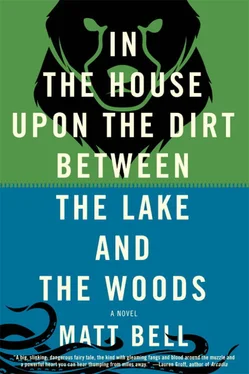And in this room: My wife’s garden, if she had not abandoned its offerings to eat the meat of the woods. What she might have grown with the labors of her hands instead of the song of her voice. What this dirt would have yielded to us, if only she had again given the sun leave to shine.
And in this room: a silver bowl full of her tomatoes, one taste of which revealed the tang of their song-stuff, their lack of right reality, despite skin, despite juice and seeds.
And in this room: all the faces of the fish I had taken from the lake, piled into a single mash of eyes and gills, teeth and scales. How surprised I was to see them, and how easy it was to forget how many lives I took just to keep myself alive, to feed my wife and the foundling. All these bodies, knifed open so we might continue another day.
And in this room: The death of a badger, cradled in steel, rehashed. The static of an action worn down by repetition, this series of moments brought to completion only to begin again, reduced, semi-badgers torn and tortured into some novel shape.
And in this room: an empty space in which, if I had watched long enough, the badger might eventually have been made separate from the trap, freed from its circumstance, if not the damage done.
And in this room: a floor of hides, stitched from the skins of what I had trapped, where I could not stop myself from kneeling upon the floor, from digging the hooks of my fingers into its stitching. I pulled and pulled and undid some of its ties, and from beneath I revealed only more flooring, more skins sewn to skins, and soon there was around me a pit of flesh, a hollow stinking of its taxidermy, and below that only more skin, only more fur.
And in this room: the buzzing of bees and then, elsewhere, another room, full of bees. Two separate rooms, one with the bees themselves, silent, and the other filled only with their sound. How many more rooms I knew there must be if that continued. How much more house it took to keep things separate, to break them down.
And in this room: the smell of decomposing onion and beet, potato and rutabaga—all that vegetal rot.
And in this room: The last sunflowers of my wife’s garden, the first that stretched their petals toward her red moon instead of the sun that barely again rose over the dirt; and if the light of the moon was mere reflection, and the light of two moons doubly so, why then their different hues, against the vast black of the sky?
And in this room: a fistful of black seeds.
In the next room, the shell of the bear: her proud bones stuck through her skin, her bristled fur fallen like pine needles. Her claws pulled from their moorings, her teeth loose in her jaws, her breath rotten as fallen bark, worm-struck as the earth beneath her woods, stinking of meat eaten long past its date, dug up.
And in this room: my wife’s favorite dress, worn the first time she danced with me. How when I held the fabric to my face I smelled nothing, because the smell of her sweat was in another room.
And in this room: a well-scrubbed floor, and on it a well-scoured pot, scratched by the removal of meals we shared, of meals we ate apart.
And in this room: a bowl made of mirrors, so that as I drank of it, it drank of me.
And in this room: the song of the stars, never heard after it was silenced above the dirt, and before that never this clearly. How I had forgotten even what I had forgotten, this series of notes that made a song that made a story, all so hard to retell without their sharp light present, hard to hear or hum even when the stars yet hung from the sky, and impossible now that their shapes had been extinguished. And again my wife had remembered, as I had not.
And in this room: lightning. And in this room: thunder. And in this room: how long it had been since it rained.
And in this room: the smell of a mother’s sadness, but not my wife’s. Hers I would have recognized easily, but this one took some longer effort, for what man could know the tears of a bear, the way her sorrow-sweat stinks, soaked through fur and hide?
How now I could, because the bear had filled my skin with her breath, and if some part of me was the fingerling, so perhaps some other portion was the bear.
And in this room: How my wife made the bear weak. How she lay flat upon the dirt, upon the dirt floor of our cellar, and put her cheek upon the ground. How she whispered songs into the earth, how with those songs’ reverberations she lulled the bear to sleep even as she kept her sleep restless, to delay her rival’s tracking, her waking attempts to move upon the dirt. How the wounds my wife had given the bear worsened, how the bone snapped free of the rib meat, of the fleshy parts of the neck.
AND IN THIS ROOM, THISnew series of rooms that followed: My wife walking out of the house and across the dirt.
My wife lifting the hem of her skirt above the brambles at the tree line, choosing her steps carefully as she navigated the trapped woods.
My wife slowing to look at deer and elk, muskrat and wood-chuck, rabbit and squirrel, all still whole and hearty, sure sign this memory preceded the foundling, our finished family.
My wife stopping to smile from within a pillar of sunlight, such shafts already rare and soon to be rarer still.
My wife not carefree in that dappling, but preparing, gathering strength.
And in this room: the entrance to the cave at the center of the woods, marked only by her footprints in the muck, headed in.
And in this room: my wife traversing the many chambers of the bear’s cave, all descended from the one in which we so briefly lived when first we came to the dirt.
And in this room: my wife gathering the yawning cub below into her arms, then putting some few furs to rest in its place.
And in this room: the bear half lidded, locking its gaze with my wife’s, parent-that-was to parent-to-be. How angry the bear’s yellow eyes were, and how sad my wife’s.
And in this room: the song with which she beat and battered the bear.
Then another room, with the bear’s own song, its curdling attempt to fight in the manner of my wife.
And then another, with the secret of my wife’s ears, stopped up safe with wax and tiny balls of feathers.
And in this room: My wife holding the bear down with her song, then lulling that giant back to sleep. Then leaning in close, putting her lips inside the tickle of the bear’s ear, and there whisper-singing a lie, a vision to replace the truth: to make the bear believe she had awoken already and in her hunger devoured her cub, so that it might live no more, so that it might be back inside her, a jumble of leg and paw, face and fur, all feeding the one who fed it.
And in this room: How my wife was not sure she had succeeded until months later, when the bear awoke from her long hibernation to howl her shamed horror into the earth, to fill her cave with worse sound, to shake the earth and also the trees above, frightening the birds to flight, the beasts to quivering in their burrows and their beds, and afterward the woods seemed emptier, occupied only with what ruined fauna the bear and I would make together.
And in this room: A single moment, captured during the long lonely climb out of the cave, the sleeping cub cradled to her breast. A single note of the song she sung as she climbed, that secret song I knew so well, which she had practiced upon the dirt while I slept locked inside our bedchambers.
A single note, and yet how I knew what it could do, and what other notes would follow, and how I knew that even before she emerged into the air of the woods the cub was no cub at all.
How I knew all this at that first note, knew it even before I found the other rooms containing some other single sound of that transformation from bear cub to foundling, finished even before she arrived at our front door, the entrance to a house at last filled with family.
Читать дальше













